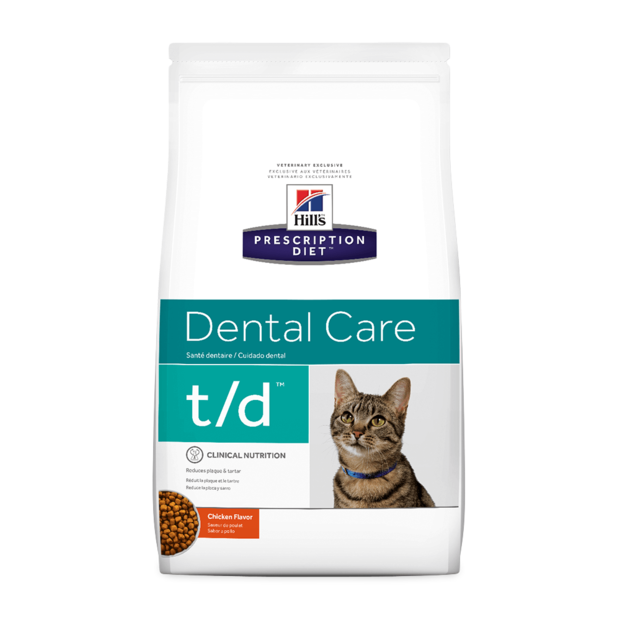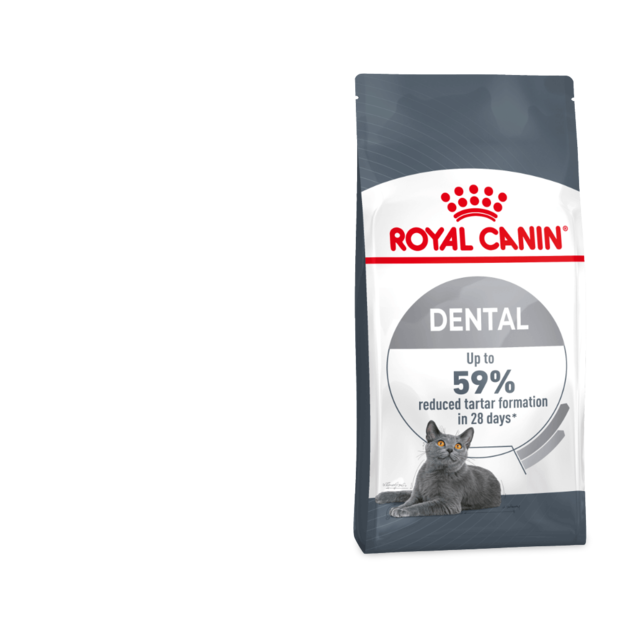Dental Care for Cats
This article is written by Pet Circle veterinarian, , updated by
Does your cat have bad breath or are they reluctant to chew their food? Dental disease may be the cause and it is a lot more common in cats than you would think.
Statistics show that 80% of cats over the age of three have dental disease, with many pet parents simply unaware that the problem is present. Left untreated, dental disease can be a constant source of pain and inflammation, impacting on your cat's overall health and well-being and affecting other organs in the body such as the kidneys, heart and liver.
Prevention is always better than cure. And thankfully, there are lots of different options available to help keep your cat's teeth clean and healthy and stop dental disease.
- What is Dental Disease?
- What are the Signs of Dental Disease in Cats
- How to Take Care of Your Cat's Teeth
What is Dental Disease?
Dental disease in cats refers to the presence of gingivitis, periodontitis and tooth resorption.
Gingivitis is inflammation of the gums, usually the result of a build up of bacteria containing plaque around the gumline of the teeth but can also be caused by some viruses and other health conditions. Preventing and treating gingivitis is key to managing your cat's dental health.
Periodontitis is what happens if gingivitis is left untreates. The bacteria causing the gingivitis invade below the gumline, resulting in more inflammation and damage to the tissue that attaches the tooth to the gum, leading to tooth root damage and ultimately teeth falling out.
Tooth Resorption is the most common cause of tooth loss in cats. The cause is still unknown, but when tooth resporption occurs the structures of the teeth are broken down beginning from the inside out. In most cases to reduce inflammation and pain, tooth resorption is treated by removal of the offending tooth (or teeth).
What are the Signs of Dental Disease in Cats

The most common sign of early dental disease noticed by cat owners is foul-smelling or 'fishy' breath. Other common indicators of dental disease are discoloured or stained teeth and red, inflamed gums. It's important to check (or have your vet check) your cat's teeth and gums regularly for signs of dental disease, because although dental disease can be very painful, some cats will continue to eat their food as normal and show no outward signs that something is wrong. Over time, dental disease results in chronic inflammation that can have serious health consequences for your pet including damage to the heart, kidneys and liver.
Good Teeth = A Longer Life Providing your pet with good dental hygiene can add 2-4 years to their life!
How to Take Care of Your Cat's Teeth

First up, if you notice that your cat has bad breath it is best to consult your veterinarian. They will be able to assess the extent of your cat's dental disease and recommend appropriate treatment. In some cases it may be necessary for your cat to have their teeth scaled and polished under general anaesthesia to remove plaque from under the gumline where it is causing disease. Once your cat's teeth have a clean bill of health from the veterinarian, you're ready to get back on track with a prevention program. Read on to discover the best ways to care for your cat's teeth.
Did You Know? Cats get 'holes' in their teeth - but it's different to cavities in humans. Rather than a reaction to sugar, 'cat cavities' or 'resorptive lesions' are caused by an autoimmune response where the body attacks the surface of the tooth. They occur in approximately 50% of cats and always require tooth extraction.
1. Daily Toothbrushing

Veterinary dentists recommend brushing your cat's teeth daily to prevent dental disease and it makes sense; after all we brush our teeth morning and night to prevent plaque and tartar too! When brushing your cat's teeth, be sure to use a cat friendly toothbrush and toothpaste as human ones are not suitable. It can take a while to get your cat used to having their teeth brushed, start out slowly with short sessions to get them used to the taste of the toothpaste and the sensation of brushing.
Shop Cat Toothbrushes and Toothpastes
2. Therapeutic Dental Diets

For cats with a history or increased risk of dental disease, therapeutic diets are the way to go.
Royal Canin Veterinary Dental Feline and Hill's Prescription Diet Feline t/d Dental Care are therapeutic diets specially formulated to prevent plaque and tartar build up on your cat's teeth. They are complete and balanced and designed to be fed as your cat's main, everyday food making them a simple way to care for your cat's teeth every day.
Therapeutic dental diets also offer other health benefits in addition to better dental health for your cat! As well as being proven to reduce dental plaque and tartar build up, Royal Canin Veterinary Dental Feline is formulated to help reduce the risk of urinary crystals and contains psyllium and dietary fibres for hairball control. Hill's Prescription Diet Feline t/d Dental Care is clinically proven to reduce gingivitis by mechanically scrubbing the teeth as your cat chews and also contains controlled mineral levels to support urinary tract health, plus added antioxidants to promote a healthy immune system.
While they will be suitable for most adult cats, as these are specialised therapeutic diets, please consult your veterinarian to make sure that they are suitable for your cat's specific needs before use.
3. Oral Care Diets

If your cat does not have a history of dental disease but you want to throw in an extra ounce of prevention to take care of their dental health, an oral care diet is for you.
Oral care diets offer a lot of the benefits of therapeutic dental diets, namely reduced plaque levels and excellent complete and balanced nutrition. Much like therapeutic diets, oral care foods for cats are best fed as your cat's main food to ensure optimal results.
4. Dental Treats
Another tool in your dental prevention toolbox are dental treats. Essentially these tasty treats work by cleaning your cat's teeth as they chew. Look for treats accepted by the Veterinary Oral Health Council (VOHC) like Feline Greenies.
If you do decide to use treats as part of your cat's dental health care plan, be sure that you take the extra calories into account to avoid overfeeding.
5. Water Additives

As far as water additives go, it's important to realise that they're not going to be enough on their own to keep gingivitis and dental disease at bay. They can however form a useful addition to your overall dental care plan for your cat. Remember to read the label closely to make sure you get the dose right and are changing the water frequently enough.
Many cats can be quite particular about the taste of their water, so another alternative to using water additives is a therapeutic gel or rinse like Tropiclean Clean Teeth Gel.
Shop Oral Care Water Additives for Cats
6. Dental Supplements and Aids

Another options to aid in the prevention of plaque build up and dental disease is the addition of a dental supplement. These come in a powder or chewable form and are designed to bind to the bacteria in your cats saliva, decreasing the formation of plaque. Added to your pets daily meal or as a tasty treat.
Shop Dental Supplements and Aids for Cats
Remember if you suspect your cat has signs of dental disease or if you are unsure, consult with your veterinarian about the best prevention program for your cat's individual needs. Got questions? Our team of in house vets is also always happy to help via our complimentary Ask a Vet service.
Further Reading
How to help your cat to lose weight
Why do cats pee where they shouldn't?
How to tell if your cat loves you
Want to know more? Check out our Discover Page for more tips on keeping your pets happy and healthy.











































